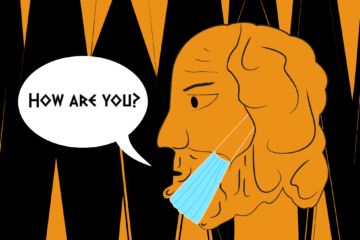In the last post we explored the phenomenon by which social revolutions re-establish the old injustices they sought to eliminate. Its Sisyphean nature is due to none other than a structural commitment to the ideological form. Now, it is time to show in more detail how the reality of ‘upcoming revolutions’ is one built on both conservation and progression working in sync.
Authenticity
In Western thought, following the notion that our self-appraisal depends on the structure, the modern reaction has been the idea that we should ‘question our reality’. In other words, one should question their norms.
Consequently, we have developed the intellectual culture of ‘critical thinking’, by which we presumably scrutinise these rules. That should mean that we solved the problem right?
If by problem, we mean the risk of over-critiquing, of dismantling all foundation of human cooperation, then yes. We certainly found a compromise by which we protected ourselves from such terrible fate.
In critical thought – the art of critique while also not critiquing – we retained a cultural foundation to be presumed by all, a common unifying cause which we should not question. As Nietzsche would have it, we all agree to take one lie for Truth, so that we can set some standard and be able to speak and communicate. The problem with this, is of course that we collectively agreed on the way how the individual must critique his society.
At this point I can’t help but think of a particular scene from Monty Python’s Life of Brian. Due to pure misunderstanding, Brian is mistakenly identified by his society as their Messiah. As the crowd gathers under his window, expecting a holy sermon, Brian reprimands them for seeking guidance. He ends up preaching to them that they do not need to follow anybody, that they are all individuals. Brian here is taking the role of a modern enlightenment sage, imploring people to be their own persons.

The irony, of course, comes out when all his listeners, in a proper herd-like fashion reply together “Yes, we are all individuals. We are all different”. Monty Python here demonstrates to us the paradox of modernity and the limits of critical thought. The paradox reaches its climax when, a man singled out from the crowd tells Brian “I am not [an individual]”. The most authentic that a person could be in this situation was to reject his own authenticity.
Mutually-Assured Destruction
So once the paradox underlying the Grand Norm of questioning norms becomes apparent, we can realise that, in another, more acute manner, the old problem – of needing to critique the same structure in which we reside – has not been solved at all.
So much is built on the established Grand Norm: our relationships, wealth, professions, power, identity, mental sanity… for most of us, it is hardly ever beneficial to undermine this structure. What is usually the case, therefore, is that in the struggle for dominance, we battle each other within the structure, while leaving the kernel of reality untouched. In other words, we retain the form but kill each other to redefine content.

Futurama: On Freedom Day, people celebrate by enjoying all sorts of liberties that are usually punished. Zoidberg takes the ideology too seriously and relishes in desecrating the Earthican flag, shocking the community. As Žižek would put it, he “over-identified” with that ideology. With this purely authentic act, he undermined the Grand Norm, demonstrating its limitations which the people otherwise ignored. Naturally, the result is his persecution.
I can think of no better analogy than the laws regulating warfare: We all know that nuclear warfare would be a mutually-assured destruction; and so, we agree not to employ it while also setting the rules as to how we can kill each other in a way by which the victor can gain something. Of course, the possibility of a nuclear option resurfaces at the point when one party stands to lose so much that they can reconsider such a choice, i.e. bring about an actual revolution.
Within the confines of the law of war, we battle each other solely on the content while pretending that it is the form that is being constantly challenged.
In this sense we can now move on to demonstrate how both conservatives and progressives are two sides of the same ideological coin.
Feathers or no feathers, they’re still Dinosaurs
Conservatives are those who seek a completely static structure. They are the ones who benefit so much that it is in their interest that even the content sticks to the status-quo. Their aim is the preservation of the signifiers upon which validation is conducted. Conservatives are naturally easier to explain and understand because of this attachment to what we already know.
Progressives are a bit more deceiving: they do in fact seek to bring about a content revolution by introducing new signifiers that are supposedly more just. A common argument that comes to mind is that ‘we should not give rights based simply on one’s citizenship, but rather on their tax contribution’. The progressive narrative is therefore that of restoring justice, which sounds nobler than merely saying ‘everything is good and just as it already is’.
It has to be stressed that while conservatives do attack progressive thought, they are not irked by the observation that there is this symbolic perversion within the same ideology. In fact, they see each other as a completely opposing ideologies. Conservatives are simply protective of the social structure in which they and their image of themselves has a place. Hence, regardless of how they might rationalize it – in terms of God’s or nature’s plan being subverted by decadence – their position is one owing allegiance to a complete status quo, to what is already known.
On the other side, as has been argued throughout the essay, the problem with the progressive movement is that it does not disrupt the form, but only the content: ‘we should still exclude some people from voting, but we should base it on their fiscal contribution’; ‘we should still be appraised on our capacity for maternal love, but it should include our love of pets’. Hence, progressives remain loyal to the ruling ideology just as much as conservatives. The only difference is that they want to re-define the means of enjoying it.

In one South Park episode, Benjamin Franklin proposes that the US must be founded on a freedom which allows both ‘red-neck’ and ‘hippie’ segments: that way the US can go to war and protest going to war at the same time
Conservatives typically come off as self-entitled jerks because they refuse to admit or apologise for their privilege over others. On the other hand, progressives propose a narrative more suitable to the humanist morality of emancipation. The former caters for the component of society that seeks stability and the latter caters for the feelings of social discontent. But together, they both serve the purpose of conserving the bigger ideology and the Grand Norm it proposes.
Democracy now starts to appear as the ingenious idea of making sure to harness this Janus-faced dynamic.
Rotating Presidencies
After being immersed in the propaganda that we are living in a new era, one would expect a much bigger change. But the thing is, if you don’t think much about it, it is in fact experienced as some form of significant transformation, some revolution. So, the most compelling phenomenon brought about by the conservative-progressive antagonism, is the alienation of the subjects from the realisation that the old and the new are uncannily similar.
In fact, the areas in which there is the highest social discontent are those in which we witness a lot of talk on ‘revolutionary’ solutions. But what takes the guise of a revolution is often just a political endeavour for one segment of society to get more rights (for itself) by engaging in the same structure that they previously declared to have been unjust.
As a result, the subversion that we often witness, does not consist in emancipating oneself from the shackles of a given social structure. Nor does it dismantle the conditions that cause some parts of society to have privileges over others. What really happens is a lexical shift by which the privilege is moved from one segment to the next, just like a rotating calendar revolves to reveal a new day and month while still functioning under the same clockwork.
The change of content is therefore the juggling of privileges and exploitations among social segments, benefiting those who currently have most voice and stepping on those who have no say. This happens when those who ‘fight the system’ typically rebel against the mistreatments they endured but remain nonetheless attached to the benefits that their abuser enjoyed.
These benefits need not be tangible instruments of power, but also sublime functions within the symbolic – i.e. that which gives us self-worth through society. Think of the typical middle class which, politically speaking, is against the old nobility that unfairly enjoyed self-generating wealth such as land worked by peasants. Yet all middle class fantasy is shaped around living in a palace, ignoring the decrepit existence of ghettos, buying property and cryptocurrencies that gain value on their own, and having servants (why do waiters still exist anyway, if not for the pure pleasure of making an order and having someone serve you?).
While we’re juggling content, how about pacifiers for adults?
As has been argued thus far, the subversion of content (rather than form) simply means a routine update by which the individual can give new names to social conditions in order to prevent the absurdity of entrenched Grand Norms from becoming too apparent.
In order for ideology to keep reproducing itself, it has to undergo a constant state of refreshing. While sticking to its form, it changes its content as often as possible in order to camouflage itself with the times. With every new petty revolution, new content is made to be consumed, to satiate the thirst for consumption, to be the first to participate in the new wave of change.
No wonder our era is one of content-creation. We are equivalent to infants pacified in front of a TV or phone. As we feed ourselves an endless stream of content, as we spend an hour swiping through social media, or rallying for some new humanitarian cause, it becomes possible to be in a constant state of action, precisely so that nothing will actually change. An active state of inertia.
Ideology Persists.



0 Comments